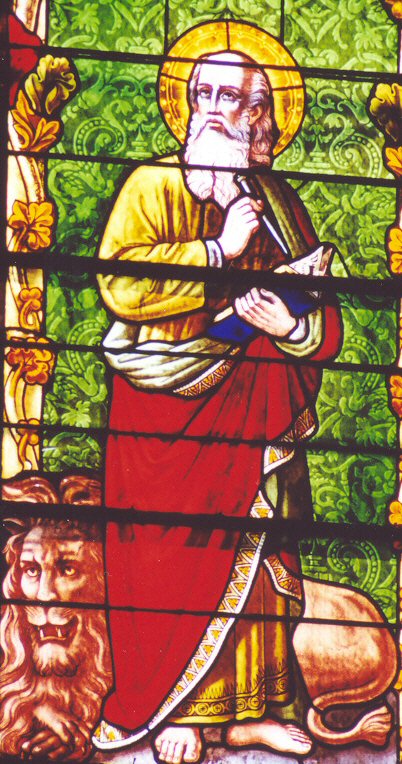 After
John had been arrested, Jesus came to Galilee proclaiming the gospel of God:
"This is the time of fulfillment. The kingdom of God is at hand.
Repent, and believe in the gospel."
After
John had been arrested, Jesus came to Galilee proclaiming the gospel of God:
"This is the time of fulfillment. The kingdom of God is at hand.
Repent, and believe in the gospel."Mark 1:14-20
Trusting and Transformed
by Rev.
Paul Scalia
Reprinted with permission of "The Arlington Herald"
Home Page
Sunday
Gospel Reflections Index
Mark wrote to explain Christ
to the new Gentile converts.
 After
John had been arrested, Jesus came to Galilee proclaiming the gospel of God:
"This is the time of fulfillment. The kingdom of God is at hand.
Repent, and believe in the gospel."
After
John had been arrested, Jesus came to Galilee proclaiming the gospel of God:
"This is the time of fulfillment. The kingdom of God is at hand.
Repent, and believe in the gospel."
As he passed by the Sea of Galilee, he saw Simon and his brother Andrew casting their nets into the sea; they were fishermen. Jesus said to them, "Come after me, and I will make you fishers of men." Then they abandoned their nets and followed him. He walked along a little farther and saw James, the son of Zebedee, and his brother John. They too were in a boat mending their nets. Then he called them. So they left their father Zebedee in the boat along with the hired men and followed him.
Come after me, and I will make you fishers of men (Mk 1:17). By these simple words Our Lord calls the apostles Peter and Andrew, James and John. Obviously, the words have a unique meaning for them and likewise a particular meaning for all priests. They apply also in a broader way to everyone. The experience of the apostles is in a sense normative for all in the apostolic church. Christ's call of them sets the pattern for how He calls us now.
First there is the centrality of Jesus. His call of the apostles has two parts: a summons ("Come after me") and a promise ("I will make you ..."). Jesus is precisely at the center of the phrases: "me ... I." He is the One to follow. He is the One Who transforms. He does not call us to an idea or a theory. He does not invite us to a hypothesis. He calls us to Himself and to His transforming power.
Thus the response to the call is a response to Jesus Himself, to His beauty and goodness. He is not just a man but the perfect man. Certainly He had no sin, but neither did He have any foibles, quirks or off-putting habits. His noble and good character was literally attractive drawing people to Him. So attractive, in fact, that these fishermen hard-working, practical-minded men left everything behind and followed Him to they knew not where. This brings us to another element of the call.
Trust. "Come after me," Jesus says to the apostles. And nothing more. No indication about the route, destination or purpose. Soon they will witness exorcisms and dramatic healings. They will become embroiled in controversy with their religious leaders. They will go up to Jerusalem and see Him hailed one day, crucified another. They will see Him risen from the dead and will preach His Gospel to the ends of the earth. But now, that is hidden from their eyes. All they see is the man before them, and that is enough. "Come after me," He says. It is not knowledge of what will happen that prompts the apostles to follow. It is trust in Him.
God does not show us the plan from beginning to end. He does not give us the itinerary in advance. He asks us to trust. We want to know everything ahead of time, to see every last detail before we set out. "Where are we going? What should I bring? What will I do? Will I be happy?" But the apostles show the proper response. The itinerary did not matter as much as the Companion. The destination did not matter as long as He was with them on the journey. And that journey was more profoundly interior than external. This brings us to the final point.
Transformation. Our Lord promises nothing to the apostles except what He will do to them: "I will make you fishers of men." He does not promise wealth or fame or pleasure. He does not even guarantee success in their work. He promises only to make them more than they are. And He was faithful to that promise, making these simple fishermen the foundation of His church.
God calls us in order to transform us. Yes, He calls us to certain tasks. But external success in accomplishing a task is not as important as allowing His grace to work within us. If God has called us to a particular work or state in life, it is not so that we will simply do the work (after all, He could do it better Himself) but so that we will be transformed sanctified in our labor for Him.
It is by way of trust in Jesus Christ that we are transformed. The transformation comes by way of the following. We think (and insist) that He will transform us in order to follow Him. But it works the other way. He calls us like the apostles, imperfect and unprepared to trust in Him personally. He will do the rest, transforming us according to our trust.